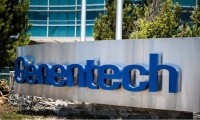-
Roche’s subcutaneous Tecentriq recommended by CHMP for multiple cancer types
- Source: drugdu
- 171
- November 18, 2023
-
Roche Cuts Pipeline as COVID, Currency Headwinds Impact Q3 Results
- Source: By Tristan Manalac
- 141
- October 31, 2023
-
Roche announces positive phase 3 results for Alecensa in early-stage lung cancer
- Source: https://www.pmlive.com/pharma_news/roches_alecensa_shows_promise_in_phase_3_early-stage_lung_cancer_trial_1502267
- 122
- October 30, 2023
-
Royalty Boosts Struggling PTC with Additional $1B for Royalties on Roche’s Evrysdi
- Source: Kate Goodwin
- 120
- October 21, 2023
-
Roche’s Subcutaneous Ocrevus Rivals IV Formulation in Phase III MS Trial
- Source: drugdu
- 116
- October 13, 2023
-
Roche presents positive results for spinal muscular atrophy treatment Evrysdi in babies
- Source: drugdu
- 207
- October 10, 2023
-
Roche condemns ‘act of counterfeiting’ as authorities in Pakistan crack down on unapproved Avastin use
- Source: drugdu
- 127
- October 6, 2023
-
Roche scores—again—in hemophilia drug patent case against Takeda
- Source: drugdu
- 188
- October 1, 2023
-
Roche hits FDA delay with subcutaneous version of Tecentriq amid manufacturing process changes
- Source: drugdu
- 165
- September 9, 2023
-
Following in Tecentriq’s footsteps, Alecensa gives Roche another win in early-stage lung cancer
- Source: drugdu
- 116
- September 6, 2023
your submission has already been received.
OK
Subscribe
Please enter a valid Email address!
Submit
The most relevant industry news & insight will be sent to you every two weeks.













